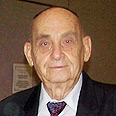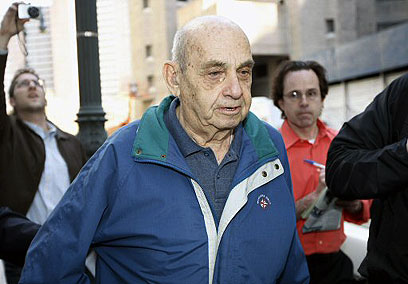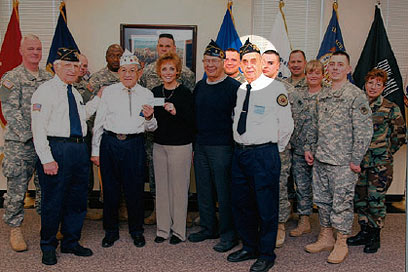
American accused of giving nuclear secrets to Israel
Department of Justice says US citizen arrested on suspicion of having provided sensitive information to Israeli agents regarding nuclear weapons, fighter jets, air defense missiles during 1980's
United States authorities arrested an American engineer on Tuesday on suspicion of giving military secrets involving nuclear weapons, fighter jets and air defense missiles to Israel during the 1980s, the Justice Department said. Investigators believe 83-year-old Ben-Ami Kadish took home secret documents
and let the Israeli government worker photograph them.
Court papers indicate Kadish acknowledged his spying in FBI interviews and said he acted out of a belief that he was helping Israel. Kadish was arrested in New Jersey and was arraigned on Tuesday afternoon at the District Court in Manhattan.
Kadish was released after the arraignment after the New York justice read through the indictment and asked the defendant if he understood the charges. Kadish answered that he did. Bail was set at $300,000, with no objection from the prosecution.
Born in Connecticut, Kadish was employed at the time at a US army facility in New Jersey and had access to a large volume of sensitive information regarding weapons systems, including the sale of F-15 fighter planes which were sold to a Middle East country other than Israel. The information provided by the agent included the various modifications that had been made to those jets.

Kadish arrives at court on Tuesday (Photo: Reuters)
Kadish, an army mechanical engineer, has been charged with he slipped classified documents about nuclear weapons to his Israeli handler.
Kadish, who had a security clearance, took 50 to 100 classified documents from the arsenal's library, working from a list provided by the handler identified in a federal complaint as "CC-1." The handler would then photograph the documents in Kadish's basement and Kadish would return them to the library, the complaint said.
'Don't say anything'
Court papers say Kadish's spying lasted roughly from 1979 to 1985, and his contact with the unidentified Israeli handler continued until March of this year - reportedly the same handler who dealt with Jonathan Pollard.
The complaint said Kadish maintained contact with his handler, met him in Israel in 2004, and spoke with him by telephone on March 20 of this year, after his first FBI interview. It said the handler told him to lie to US authorities: "Don't say anything ... What happened 25 years ago? You don't remember anything," the handler was quoted as saying.

Kadish at an event for army veterans (Photo: jwv.org)
The complaint said the handler worked for the Israeli government as consul for science affairs at the Israeli Consulate General in New York, from 1980 to November 1985.
The history appears to fit with that of Yosef Yagur, who has been publicly linked to the Pollard case.
Kadish is charged with four counts: one count of conspiring to disclose documents related to the national defense of the United States to the Government of Israel; one count of conspiring to act as an agent of the Government of Israel; one count of conspiring to hinder a communication to a law enforcement officer; and one count of conspiring to make a materially false statement to a law enforcement officer.
US: We will inform Israelis
"We will be informing the Israelis of this action," State Department spokesman Tom Casey said. "Twenty-plus years ago during the Pollard case we noted that this was not the kind of behavior we would expect from friends and allies and that would remain the case today."
The Israeli Foreign Affairs Ministry said they had no information regarding the affair and had learned of it from media reports.
A senior Israeli defense official said "I find it hard to believe that, after the Pollard affair, we would recruit an American spy."
Pollard affair
In 1985 a diplomatic crisis emerged between Jerusalem and Washington after Pollard, US naval officer, was convicted of spying for Israel. Pollard joined the navy in 1979 as an intelligence data analyst and five years later was transferred to a Washington research unit involved in counterterrorism intelligence.
That year he met an Israeli Air Force officer called Aviam Sela who was residing in the US at the time. A
short time later Pollard was recruited to a covert Israeli intelligence agency.
In October 1985 Pollard's supervisors became suspicious of his activities and later exposed him. Pollard and his wife were denied refuge at the Israeli embassy in Washington and the two were arrested by FBI agents waiting nearby.
Pollard was sentenced to life in prison.
The Israeli government said it was unaware of Pollard's activities and issued a formal apology. Following negotiations between the two countries, the government agreed to a US investigation of Israelis who were involved in the affair.
Roni Sofer and Reuters contributed to this report










